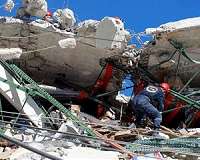| . |  |
. |
Port-Au-Prince (AFP) Feb 5, 2010 They ran up and down the street, the crowd slowly building to several hundred as more joined in, yelling for jobs, for schools to open and, most of all, for food. One shirtless man carrying a concrete block was frantic as he approached them, and the protesters, who said they had been living in a camp since losing their homes in last month's massive earthquake, seemed to welcome his call. "I'm ready to fight for you!" he yelled. Wednesday's demonstration was not huge, but it was a clear sign of the frustration building in post-quake Haiti. It has been over three weeks since the disaster left at least 212,000 dead and more than one million homeless in what was already the poorest country in the Americas, and shock is giving way to anger. There have been no more miracle rescues of survivors buried under rubble and the non-stop coverage on the world's 24-hour news networks has dissipated. What's left are simply the solemn reality: Haitians sleeping in the streets in front of their crumbled homes, a huge swath of the country essentially cracked in half, and what many criticize as a woefully inadequate government and aid effort. Bleze Line, 31 and the father of a three-year-old boy, pointed to the spot in the grass where he and others from the Pivoine area of Port-au-Prince buried three friends who died in the quake. Just behind him, his neighbors hammered together shelters of aluminum and wood salvaged from their collapsed homes, located just uphill and lying in ruin. Earlier, a chunk of debris fell on a man's back as he worked, and others carried him on a stretcher made of an old wooden door, seeking help. Line said he thinks the man will be all right. But there are bigger problems. There isn't nearly enough food for what is left of the neighborhood, where he said "the majority" of residents were killed. "There are only 40 cards to get food," he said, referring to cards distributed as part of the aid effort that allow for a half-sack, or about 25 pounds (11 kilograms), of rice. "There are 107 families here. There are families with 10 people." Countries and groups in charge of aid have recently sought to better organize distribution by handing the food to women who are first given cards entitling them to the handouts. But the flood of complaints continues unabated from desperate Haitians, and food isn't the only necessity in short supply. Tens of thousands of promised tents have also not been delivered, and Haitian government officials can't explain why. Patrick Delatour, the tourism minister now put in charge of reconstruction, said this week that the international community had promised 200,000 tents but Haiti's government had only seen 4,000. Aid groups were handling their distribution and "not one tent has been given to the Haitian government," he added. Asked what happened to the other tents, Delatour said "they never existed." Yet the United Nations announced this week that more than 10,000 family-sized tents had been distributed with some 16,000 in stock. Haitians have been finding their own solutions, building new shelters with the rubble of their old homes -- a practice the government discourages so demolition and proper rebuilding can occur -- and sleeping wherever they can. Some have even taken up residence in front of the court where 10 Americans were charged on Thursday with kidnapping and conspiracy over their alleged attempt to take 33 children across the border into the Dominican Republic. A few had tents, while others said they were simply sleeping on the ground. As the hearing for the Americans got underway, two women cut tomatoes and peppers to cook over a charcoal fire. "The Haitian government doesn't exist for us," said 39-year-old Beatrice St. Julien.
Share This Article With Planet Earth
Related Links Bringing Order To A World Of Disasters A world of storm and tempest When the Earth Quakes
 Haiti Earthquake: A Reminder That Disasters Are Preventable
Haiti Earthquake: A Reminder That Disasters Are PreventableBoulder CO (SPX) Feb 04, 2010 Amid all the commentary focused on the historic tragedy in Haiti, a tough but important fact has gone virtually unmentioned, according to a nationally recognized expert on disasters at the University of Colorado at Boulder. "What is missing from the tragedy of disaster, and our response to it, is the recognition that disasters are preventable, that it is within the power of societies and c ... read more |
|
| The content herein, unless otherwise known to be public domain, are Copyright 1995-2010 - SpaceDaily. AFP and UPI Wire Stories are copyright Agence France-Presse and United Press International. ESA Portal Reports are copyright European Space Agency. All NASA sourced material is public domain. Additional copyrights may apply in whole or part to other bona fide parties. Advertising does not imply endorsement,agreement or approval of any opinions, statements or information provided by SpaceDaily on any Web page published or hosted by SpaceDaily. Privacy Statement |